Understanding Conures: Care and Behavior Guide


Intro
Conures are captivating small to medium-sized parrots known for their lively and sociable nature. They exhibit a wide range of colors and sizes, making them appealing pets for many bird enthusiasts. Understanding the unique traits and behaviors of conures is not only essential for their well-being but also for creating a fulfilling environment. This guide serves as a comprehensive resource for both novice and experienced bird owners, outlining important aspects of conure care, behavioral insights, nutritional needs, wellness requirements, and enriching activities.
Care Tips
Caring for conures involves more than just providing food and water. It requires attention to everyday routines, proper cage setup, hygiene practices, and seasonal adjustments.
Daily Care Routines
Daily routines play a crucial role in maintaining the health and happiness of conures. Owners should ensure that they interact with their birds daily. This includes talking to them, providing mental stimulation, and offering social experiences. Regular out-of-cage time is also vital as it allows these birds to exercise and explore their surroundings.
Cage Setup and Maintenance
A well-set-up cage is fundamental to a conure's quality of life. The cage should be spacious enough to allow free movement. Horizontal bars offer better climbing opportunities. Regular maintenance of the cage is needed to provide a safe environment. Clean the cage at least once a week to remove waste and uneaten food. A fresh layer of bedding and clean toys keeps their space enjoyable.
Hygiene and Cleaning Practices
In addition to cage maintenance, personal hygiene is important for both bird and owner. Wash your hands before and after handling the bird. Regularly inspect and clean food and water dishes to prevent bacterial growth. The bird’s wings and beak may require occasional grooming as well.
Seasonal Care Adjustments
Seasonal changes impact conure care. During the winter, ensure the bird stays warm by placing the cage away from drafts. In summer, ensure good ventilation and access to fresh water. Be mindful of humidity levels, as conures can be sensitive to dry air.
Behavioral Insights
Understanding conure behavior is critical for fostering a strong bond. Knowledge of their communication styles and body language aids in meeting their social needs.
Understanding Bird Body Language
Conures are expressive. Their body language includes head tilting, puffed feathers, and vocalizations. A relaxed bird may stand tall with feathers smooth, while an agitated one may puff up or back away. Recognizing these signs helps in understanding their mood.
Common Behavioral Issues and Solutions
Behavioral issues may arise, such as excessive screaming or biting. Identifying triggers is essential. Providing alternative activities or training can help mitigate these behaviors. For example, if a bird screams for attention, training it to quiet down may be effective.
Positive Reinforcement Techniques
Using positive reinforcement is valuable for training conures. Rewarding desired behaviors with treats or verbal praise establishes a strong bond. This method encourages the bird to repeat the actions.
Social Interaction Needs
Conures thrive on social interaction. They are affectionate birds, needing quality time with their owners or other birds. Loneliness can lead to depression, so it is essential to provide companionship.
Nutrition Guides
Feeding conures a balanced diet is crucial for their health. Their dietary habits require careful consideration of food quality and variety.
Essential Diet Components
A well-rounded diet features high-quality pellets, fresh fruits, vegetables, and selected seeds. Pellets should make up the majority as they offer complete nutrition.
Safe and Toxic Foods
Some foods are safe while others can be hazardous. Safe options include apples, carrots, and broccoli. However, avoid avocados and chocolate, as these can be toxic. Always research food before offering it to ensure safety.
Supplements and Treats
Supplements may be necessary to fill nutritional gaps. Calcium-rich options, like cuttlebone, should be available. Treats like nuts can be given in moderation, ensuring they do not exceed 10% of the diet.
Feeding Strategies for Different Species
Feeding strategies may vary across conure species. Assess each species' unique needs based on size and behavior. For example, larger conures may require more seeds in their diet than smaller ones.
Wellness and Health
A regular health check-up forms the backbone of a good care strategy.
Routine Health Checkups
Frequent visits to an avian veterinarian ensure that conures receive preventive care. A checkup should happen at least once a year. Blood tests may be suggested to assess overall health.
Identifying Symptoms of Illness
Become familiar with common signs of illness, such as changes in appetite or behavior. If a conure shows symptoms like feather plucking, it may indicate underlying health issues. Delaying a vet visit can worsen problems.
Preventative Care and Vaccinations
Vaccinations for certain diseases can prevent serious health risks. Follow your veterinarian’s recommendations for vaccination schedules.
Mental and Emotional Well-being
Conures are intelligent and social birds. Ensuring their mental stimulation is important. Strategies include providing toys, puzzles, and interactive games.
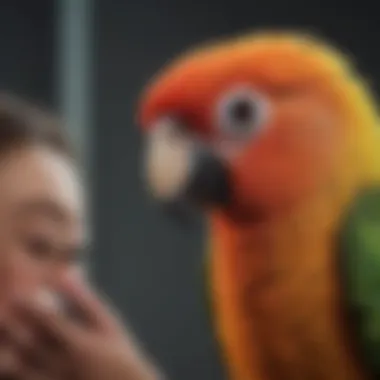
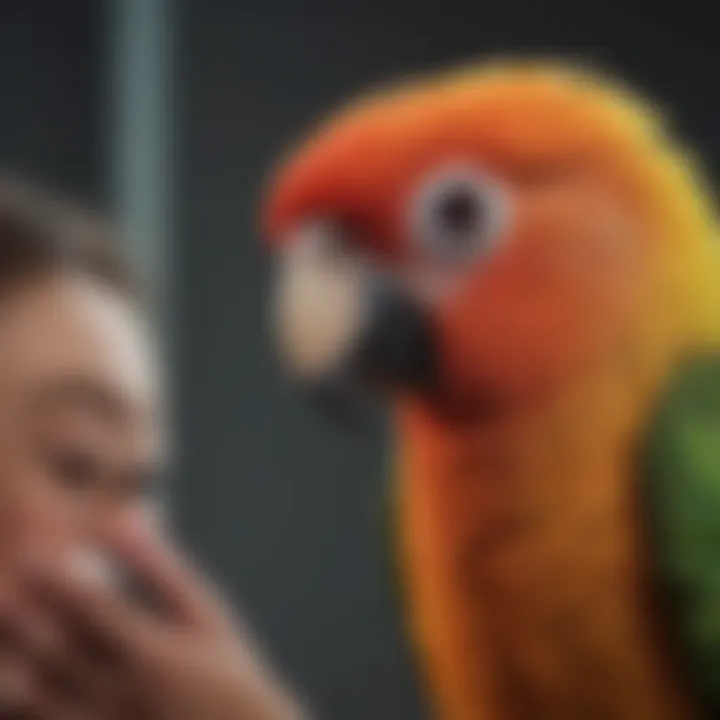
Enriching Activities
Engaging in lively activities plays a significant role in keeping conures entertained.
Toys and Playtime Ideas
Rotate toys regularly to maintain interest. Simple toys made of wood or natural materials are great options. Playing with your conure every day fosters a strong bond.
Training and Tricks
Training can be fun for both the bird and the owner. Teach tricks like step-up commands or ring toss, which helps in mental stimulation. Start with simple commands and gradually introduce more complex tasks.
Outdoor Activities and Interaction
Weather permitting, allow conures to enjoy the outdoors safely. Utilize harnesses or safe aviaries for supervised outdoor exploration. Fresh air and novel environments can enhance their happiness and reduce stress.
DIY Projects for Mental Stimulation
Crafting homemade toys from safe materials is rewarding. Simple projects include tying knots in bits of paper or creating foraging toys using cardboard. Engaging in this kind of activity can lead to better behavioral outcomes.
Understanding the complexities of conure care is key to ensuring they lead rich, fulfilling lives. As their caretakers, we hold a crucial responsbility in their health and happiness.
Preamble to Conures
Conures are popular pet birds known for their vibrant colors and lively personalities. They are small to medium-sized parrots that belong to the family Psittacidae. Understanding conures is essential for current and prospective owners.
The depth of knowledge about their behaviors, diets, and care needs directly affects their well-being. This guide will provide the necessary details to ensure these birds receive proper care and attention.
Defining Conures
Conures can be defined as social, lively birds that thrive on interaction. With their charming dispositions and striking colors, they capture the interest of many bird enthusiasts. Conures often develop strong bonds with their owners, making them excellent companions. They require active engagement and mental stimulation to remain happy. In this section, we will explore their social nature, vocalizations, and physical behaviors that make them unique.
Overview of Species
Conures encompass a wide variety of species, each with unique traits and characteristics. Understanding these species provides insight into their specific care and behavioral needs. Four notable types of conures will be discussed in this guide:
Sun Conure
The Sun Conure is celebrated for its bright yellow and orange plumage. This species is highly social and known for its playful demeanor.
- They have a loud vocalization, which makes them very expressive.
- Their social nature makes them suitable for families or individuals who can spend ample time interacting with them.
- However, their loudness might not suit all living environments, posing a potential drawback for some owners.
Green-Cheeked Conure
The Green-Cheeked Conure is smaller compared to other conures, making it an appealing choice for those with space limitations.
- This species is well-known for its gentle nature and playfulness.
- They are quieter than Sun Conures, which can be beneficial for apartment living.
- Their smaller size does not compromise their interaction needs; they still require regular socialization and engagement.
Yellow-Sided Conure
The Yellow-Sided Conure is a variant of the Green-Cheeked Conure. It exhibits similar characteristics but displays more distinctive color patterns, mixing yellow and green tones.
- This species is also affectionate and active, making it a sought-after pet.
- It is adaptable, making it suitable for both experienced bird owners and newcomers.
- The distinctive looks add to their appeal, though like other conures, they still require consistent interaction.
Blue-Crowned Conure
The Blue-Crowned Conure stands out with its striking blue crown and unique markings.
- They are known for their intelligent behavior, which makes them relatively easy to train.
- Unlike some other conures, they tend to be more laid-back, making them ideally suited for quieter environments.
- Their calm nature does not mean they need less attention; consistent social interaction remains crucial.
Behavioral Characteristics
Behavioral characteristics are a vital part of understanding conures. These traits not only define how these birds interact with their environment but also influence their care requirements. For pet bird owners, grasping the nuances of conure behavior ensures better companionship and a more harmonious relationship. Additionally, recognizing these behaviors can prevent potential issues, making it important to pay attention to how these birds communicate and socialize.
Social Nature
Conures are inherently social birds. They thrive on interaction, whether with other birds or their human companions. Their social nature is deeply ingrained, stemming from their life in flocks in the wild. When kept as pets, they expect social engagement, which is essential for their mental and emotional well-being.
The desire for social interaction means that conures are likely to develop strong bonds with their owners. However, it also means that a single conure may experience loneliness without regular human interaction or companionship from another bird. Owners should understand the importance of daily socialization.
Common ways to engage with conures include:
- Playtime: Spend time with your conure outside of their cage for interactive play.
- Training: Engaging in training exercises not only stimulates their minds but also strengthens the bond.
- Observation: Simply spending quiet time near them can comfort the birds and reduce any anxiety.
In summary, the social nature of conures requires attentiveness from owners. It is crucial to provide sufficient interaction to promote happiness and well-being in these lively birds.
Vocalization Patterns
Vocalization is another important behavioral characteristic of conures. They are known for their ability to produce a variety of sounds, including whistles, screeches, and chatter. Understanding vocalization patterns helps owners respond appropriately to their conures’ needs and moods.
Conures vocalize for several reasons, including:
- Communication: They express feelings of happiness, frustration, or distress through different sounds.
- Attention Seeking: A conure may call out to get noticed or demand more interaction.
- Mimicry: Many conures can imitate sounds from their surroundings, including human speech.
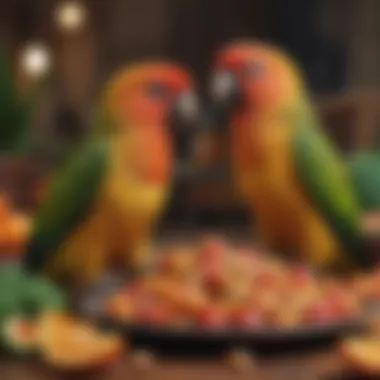
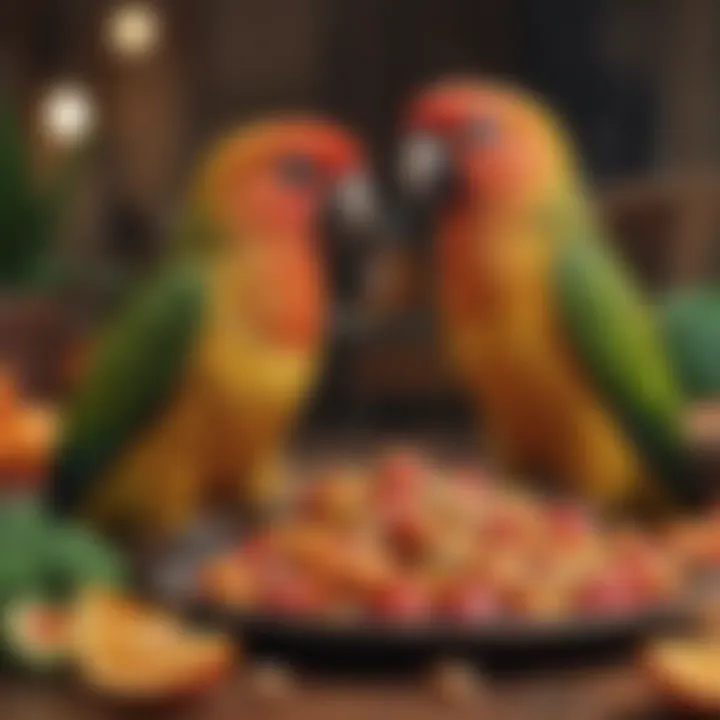
To manage their vocalization:
- Provide stimulation: Toys and engaging activities can help reduce excessive noise.
- Establish a routine: Having a consistent daily pattern can alleviate anxiety in conures, leading to more balanced vocalization.
- Encouragement: Reward quieter behavior with treats or praise to promote calmness.
Nutritional Needs
Nutritional needs are crucial for the health and well-being of conures. These birds require a balanced diet to support their high energy levels and maintain their vibrant colors. A proper diet enables them to thrive, enhancing their social behaviors and overall happiness. Neglecting these dietary requirements can lead to various health issues and behavioral problems. Therefore, understanding what conures need to eat is essential for any owner.
Essential Diet Components
Seeds and Pellets
Seeds and pellets together form the foundation diet for many conures. Seeds are often favored due to their palatability. However, they must be complemented with pellets to provide complete nutrition. Pellets are formulated to contain essential vitamins and minerals that might not be present in seeds alone.
One key characteristic of pellets is that they offer a uniform composition, ensuring that birds receive all necessary nutrients with each meal. Additionally, many birds enjoy seeds more, making them a popular choice. However, an exclusive seed diet may lead to obesity and nutritional deficiencies over time.
The unique feature of pellets is their designed nature for specific bird species. They come in various formulations, so owners can select an appropriate type for their conure. One disadvantage can be the initial reluctance of some conures to try pellets, requiring patience from their owners.
Fresh Fruits and Vegetables
Fresh fruits and vegetables are essential for conures. These foods provide necessary hydration, vitamins, and minerals. They help prevent a range of health issues and promote a strong immune system. Moreover, variety ensures a well-rounded diet, reflecting the natural feeding habits of conures in the wild.
Fruits and vegetables also engage a conure's inquisitive nature. Many birds enjoy exploring new textures and flavors, which can keep them mentally stimulated. However, there is a need to offer these items in moderation. Some fruits can be high in sugar, and others might cause digestive issues if given in excess. Therefore, it is wise for owners to research suitable options.
Common Dietary Mistakes
Common dietary mistakes can hinder the health of conures. The first mistake is an over-reliance on seeds. While seeds are popular, they lack many necessary nutrients. Another mistake is neglecting to provide fresh produce regularly. Birds require a consistent supply of fruits and vegetables to stay healthy. Also, owners may not break up their birds' food types, leading to picky eaters. Variety is crucial to ensure that conures are receiving all the nutrients they need.
Furthermore, some owners might feed their birds human food that is not safe. Foods high in fat, sugar, or salt can be harmful. It's important to be cautious and verify that every food item is suitable for birds. Education on appropriate foods can go a long way toward improving a conure's diet.
Proper nutrition shapes the overall health of your conure.
By avoiding these mistakes, conure owners can support their birds in leading healthy, active lives.
Creating an Enriching Environment
Creating an enriching environment for your conure is fundamental to their overall well-being. Conures are naturally curious and intelligent birds. An appropriate living space can significantly enhance their quality of life. An enriching environment minimizes stress and encourages natural behaviors such as chewing, flying, and foraging. When your conure feels stimulated and safe in their surroundings, they are less likely to develop behavioral issues. Hence, investing time and resources into this aspect of their care pays off in the long run.
Cage Setup and Maintenance
A well-designed cage lays the groundwork for your conure’s habitat. Consider the size of the cage carefully. It should allow your bird to move freely, stretch their wings, and climb. The recommended dimensions for a conure cage is at least 24x24x36 inches. However, larger is always better. It is important that there are no sharp edges or protruding parts that could potentially harm the bird.
Regular maintenance of the cage is necessary. Ensure you clean it at least once a week. Remove any uneaten food, waste, and debris daily to maintain hygiene.
Important factors for cage setup include:
- Perches: Use natural wood perches of various diameters to promote foot health.
- Food and Water Bowls: Place these in a location that minimizes contamination.
- Hiding Spots: Enclosed spaces can provide your conure with a sense of security.
Moreover, positioning the cage in a safe area near the family's activities encourages social interaction. Avoid placing the cage in drafty locations or direct sunlight, as both can stress your bird.
Toys and Activities
Toys are more than just entertainment; they aid in mental stimulation and physical exercise. Diverse toys, such as ropes, chew toys, and interactive puzzles, cater to your conure’s instinctual behaviors. Rotate toys regularly to maintain novelty and curiosity.
Here are essential types of toys to include:
- Chewing Toys: Conures love to chew. Safe wood toys can prevent boredom.
- Foraging Toys: These encourage your bird to search for food, mimicking natural behaviors.
- Swinging Toys: Swings can be a fun way for your bird to exercise while playing.
Activities should involve some interaction between the bird and the owner. Free flight time outside the cage under supervision can greatly benefit your conure’s mental and physical health. Enriching environments filled with appropriate setups lead to healthier and happier pet owners.
"A well-stimulated conure is a content conure. Their environment should reflect their need for exploration and play."
In summary, creating an enriching environment goes beyond aesthetics. It plays a vital role in your conure's happiness and longevity, providing the framework for a fulfilling life.
Health and Wellness Considerations
The health and wellness of conures is a critical aspect of their care. Understanding how to maintain their physical well-being is essential for all conure owners. This section focuses on preventive care and recognizing signs of illness. Both elements play a fundamental role in ensuring that your bird remains healthy and active throughout its life.
Preventive Care
Preventive care is one of the most effective strategies for keeping conures healthy. Regular veterinary check-ups are crucial. Such visits help in early detection of problems that can escalate if left unaddressed. Vaccinations may also be necessary, depending on the species and local regulations.
Another key component is monitoring their diet. A balanced diet not only supports their immune system but promotes overall vitality. Ensure that your conure receives seeds, pellets, fresh fruits, and vegetables daily. However, it is vital to avoid processed or sugary foods, which can harm their health.
Regular cleaning of the birdcage and their environment contributes to their wellness as well. Dirty cages increase the risk of infections and diseases. Therefore, maintain cleanliness and provide fresh water daily.
- Schedule yearly vet visits.
- Offer a balanced diet: seeds, pellets, fruits, and veggies.
- Keep the living area clean and mess-free.
In addition to proper nutrition, providing mental stimulation is important. Puzzle toys or interactive activities can prevent boredom and associated behavioral issues.
Signs of Illness
Recognizing signs of illness in conures requires vigilance. Conures can be great at hiding discomfort. Being aware of the subtle changes in their behavior offers vital insights into their health.
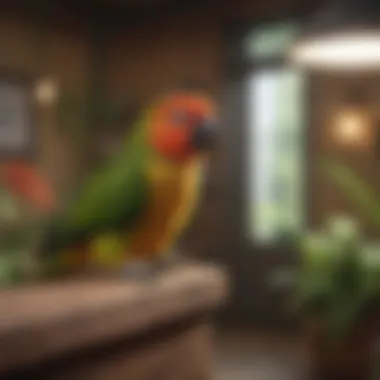
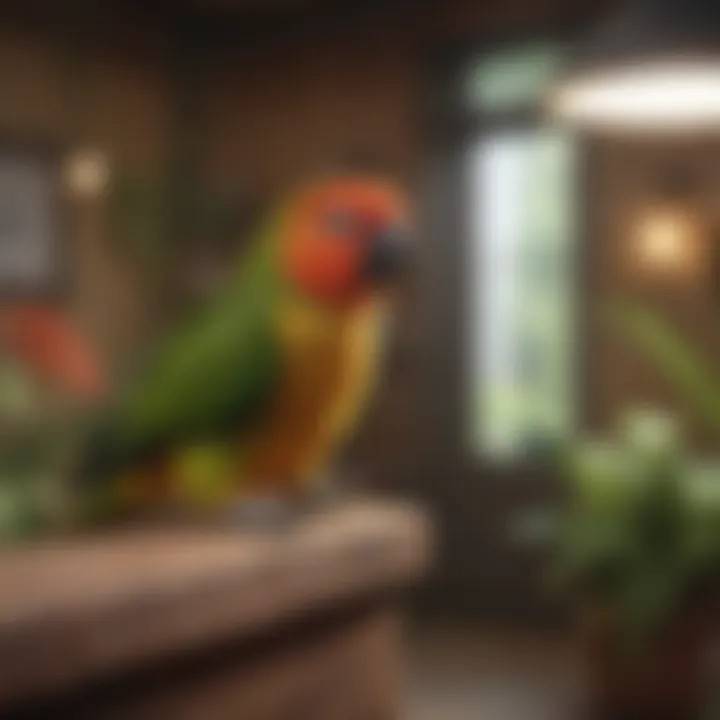
Some common signs of illness include:
- Change in appetite: A sudden decrease in food or water intake can indicate health issues.
- Lethargy: If your bird is less active than usual, it may signal illness.
- Feather plucking: This behavior can suggest stress or health problems.
- Respiratory issues: Coughing, wheezing, or difficulty breathing are serious signs that need immediate attention.
- Changes in droppings: Abnormal stool color or consistency should not be overlooked.
Being attentive to your conure's daily habits will aid in early detection of health problems. Noticing minor changes may help save your bird's life.
Life Expectancy and Aging
Understanding the life expectancy and aging process in conures is essential for any bird owner. Knowing how long these birds usually live can help in planning their care, ensuring they receive the right support as they grow older. Conures typically live between 20 to 30 years, depending on the species and their care conditions. This lifespan allows for a long-term companionship, but it also means that owners must be prepared for the responsibility that comes with aging birds.
The aging process in conures can affect their health and behavior. As they age, conures may become less active or more prone to certain health issues. Recognizing these changes early can help in addressing potential problems before they escalate. Regular vet check-ups are crucial, as they can provide insights into the aging process and identify health concerns early on. Additionally, having knowledge about the common issues in older birds can help determine the best course of action for care and management.
Understanding Aging in Conures
Aging in conures manifests in various ways, including changes in physical appearance and behavior. Owners may notice a decrease in energy levels, changes in feather quality, or altered eating habits. These signs often indicate the need for adjustments in care routines.
- Physical Changes: As conures age, they may develop signs such as graying feathers or a decline in the brightness of their plumage. Joint stiffness can occur, resulting in less mobility.
- Behavioral Shifts: Older conures might become less social or exhibit altered vocalization patterns. They may also seek more comfort or prefer quiet environments.
It is vital for owners to maintain regular interactions, even as their birds age. This helps to preserve the bond and ensures that behavioral changes are addressed promptly.
Support for Older Birds
Supporting older conures requires an intentional approach to care. Here are several strategies that can significantly improve their quality of life:
- Dietary Adjustments: Older birds might need a diet that is easier to digest. Consider offering softer foods or those fortified with vitamins. Include nutrient-rich options such as cooked grains and soft fruits.
- Comfortable Environment: Modify their living space to include soft perches and a cozy nesting area. Ensure the cage is easily accessible, reducing the need for excessive climbing.
- Enhanced Veterinary Care: Schedule more frequent vet visits to monitor their health closely. Discuss any unusual behaviors with the vet, as they can suggest specific adjustments in care.
- Mental Stimulation: Engage older conures with gentle, interactive toys that cater to their lower energy levels. Puzzles or foraging activities can help keep their minds sharp without overwhelming them.
As conures age, it is essential to remain observant and adaptable to their needs. Providing each bird with a tailored approach will ensure that they remain happy and healthy through their golden years.
Socialization and Interaction
Socialization and interaction play a crucial role in the well-being of conures. These birds are naturally social creatures, flourishing in environments that promote engagement and bonding with their human caregivers. It is essential to understand how to foster these connections, as the absence of stimulation can lead to behavioral problems and stress among conures.
Bonding with Your Conure
Establishing a bond with your conure is fundamental to creating a strong relationship. This bond enables the bird to feel secure and valued. Start by spending quality time with your conure through daily interactions. It is advisable to initiate contact in a calm and gentle manner.
Here are a few strategies to enhance bonding:
- Consistent Handling: Gently handle your conure daily. This increases comfort with human interaction.
- Treats: Use healthy treats like sunflower seeds or pieces of fruit during training or simply for positive reinforcement.
- Respect Its Space: Allow the bird to come to you when it feels ready. Avoid forcing interactions.
- Voice and Cues: Speak softly, use the bird's name, and employ consistent vocal tones. Birds respond well to familiar sounds, enhancing connection.
By establishing trust, you may notice your conure mimicking your actions or sounds. It’s a positive sign of bonding and comfort.
"Birds need social interactions not only with their species but also with humans to thrive. The more you engage, the more enriched their life becomes."
Training Basics
Training your conure is not only about teaching tricks but also enhancing its social skills and reducing undesirable behavior. Effective training should be positive and rewarding, creating a friendly atmosphere for learning.
Consider these core principles for training your conure:
- Set Clear Goals: Define what behaviors or tricks you want to teach, such as stepping up, flying to you, or speaking certain words.
- Frequent Sessions: Short, regular training sessions are more effective than long, exhausting ones. Aim for about 10-15 minutes daily.
- Positive Reinforcement: Use a clicker or your voice as a signal when your conure achieves a goal, followed by a treat. This helps them associate positive actions with rewards.
- Patience and Consistency: Some conures may take time to learn; be patient and consistent in your approach. Reinforcement of desired behaviors should remain steady throughout the training process.
- Socialization with Others: Encourage your conure to interact with family and friends. This helps to normalize various human interactions and builds their confidence.
In summary, socialization and interaction are key components to a healthy, well-adjusted conure. Investing time in bonding and training will enhance both your experiences and those of your pet.
Addressing Behavioral Issues
Addressing behavioral issues in conures is an essential aspect of their care. Understanding these problems contributes greatly to maintaining a healthy and happy bird. Conures are known for their vibrant personalities, but with that vibrancy can come certain challenges. Recognizing and addressing these issues early can prevent them from escalating, leading to a more harmonious environment for both the bird and its owner. Behavioral problems can affect the relationship between the bird and the owner, causing stress and misunderstanding. Therefore, approaching this topic with informed strategies is vital for any conure owner.
Understanding Common Behavioral Problems
Common behavioral issues in conures can usually be classified into several categories. Some of the most frequently encountered problems include:
- Aggression: This may manifest as biting, especially in stressful situations or during hormonal changes.
- Screaming: While conures are vocal birds, excessive noise can indicate distress or boredom.
- Destructive Behavior: Chewing on inappropriate items like furniture or electrical wires can lead to dangerous situations.
- Fearfulness: New environments or sudden changes can trigger anxiety in conures.
- Plucking: Feather plucking can be a sign of psychological distress or medical issues.
Recognizing the signs of these problems is crucial. In many cases, the underlying cause can be linked to environmental factors, lack of stimulation, or insufficient social interaction. By being observant and proactive, owners can mitigate these issues before they become more serious.
Effective Modification Techniques
When it comes to modifying unwanted behaviors in conures, several techniques can prove effective. Here are some recommended strategies:
- Consistent Training: Establish a routine for commands and rewards to reinforce good behavior. Simple commands such as "no" or "come" can be taught through positive reinforcement.
- Provide Enrichment: Ensure that your conure has a stimulating environment. This includes a variety of toys, perches, and opportunities for social interaction. Keeping the conure engaged can significantly reduce destructive behaviors.
- Positive Reinforcement: Reward your conure with treats or praise when it exhibits desirable behaviors. This helps the bird associate positive outcomes with good actions.
- Avoid Punishment: Negative reinforcement can lead to fear and anxiety, making problems worse. It is better to redirect negative behavior than to punish.
- Consult a Professional: If behavior problems persist, seeking guidance from an avian behaviorist can provide tailored solutions based on individual circumstances.
Addressing behavioral issues with understanding and compassion fosters a stronger bond between conure and owner.
By employing these techniques and understanding the root causes of behavioral problems, conure owners can create a supportive environment that promotes good behavior and enhances the overall well-being of their pets.
Epilogue
The conclusion of this comprehensive guide serves to underscore the essential aspects of conure care and behavior. It is vital for every conure owner to synthesize the knowledge presented throughout the article. This encompasses nutritional needs, behavioral traits, socialization practices, and health protocols. A conure's well-being is contingent upon a holistic approach that addresses all these elements.
Summary of Best Practices
- Balanced Diet: Ensure that your conure receives a well-rounded diet comprising seeds, pellets, fresh fruits, and vegetables. This combination provides necessary vitamins and minerals that promote vitality.
- Social Interaction: Engage consistently with your bird to establish a strong bond. Regular socialization minimizes stress and fosters a healthy emotional state, enhancing your pet's overall happiness.
- Cage Environment: The habitat should be spacious and safe. Proper cage setup, maintenance, and the inclusion of various toys contribute to mental stimulation and physical health.
- Regular Health Checks: Schedule periodic vet visits to monitor your bird's health. Preventive care is key to detecting potential health issues before they escalate.
- Behavior Modification: Address behavioral issues promptly and constructively. Employ positive reinforcement methods to ensure effective communication and behavioral management.
Future Considerations for Conure Owners
As conure owners, one must remain aware of the evolving landscape of avian care. Here are some considerations to keep in mind:
- Research New Trends: Keep abreast of the latest information regarding conure care, such as dietary innovations and behavioral studies. Online platforms like Reddit and Facebook can provide a wealth of community knowledge.
- Exploring New Products: Stay open to new products that can enhance your conure’s life. This includes advanced toys and enrichment tools designed for mental stimulation.
- Community Engagement: Engaging with other bird owners can lead to insightful exchanges of experiences and best practices. Platforms like en.wikipedia.org and britannica.com can also be informative resources.
By adhering to these best practices and being proactive in your approach, you can contribute to your conure’s well-being and happiness. This knowledge isn’t just for individual owners; it forms a community of informed conure enthusiasts who prioritize proper care for these vibrant birds.















